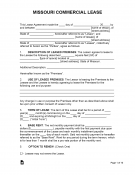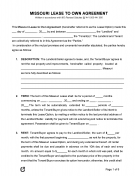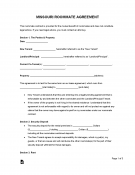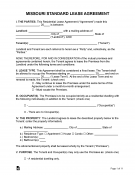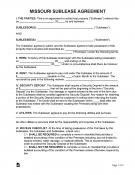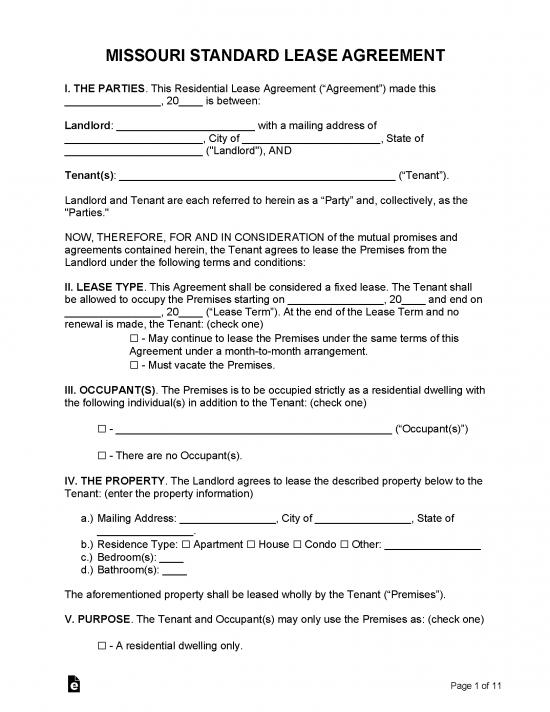Missouri lease agreements are contracts that set the terms of a tenant’s lease of a landlord’s property. The lease agreement will name the monthly rent, specify responsibility for utilities, and explain other duties of the parties. Both the landlord and the tenant should keep a copy of the lease agreement, and refer to it in the event of a disagreement.
Contents
By Type (6)
- Commercial Lease Agreement
- Month-to-Month Lease Agreement
- Rent-to-Own Lease Agreement
- Roommate Lease Agreement
- Standard Lease Agreement
- Sublease Agreement
Download: Adobe PDF, MS Word, Rich Text Format
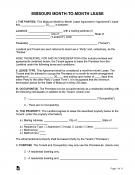 Month-to-Month Lease Agreement
Month-to-Month Lease Agreement
Download: Adobe PDF, MS Word, Rich Text Format
Download: Adobe PDF, MS Word, Rich Text Format
Download: Adobe PDF, MS Word, Rich Text Format
Download: Adobe PDF, MS Word, Rich Text Format
Download: Adobe PDF, MS Word, Rich Text Format
Landlord-Tenant Laws
Statutes – Title XXIX, Chapter 441 (Landlord and Tenant), Title XXXVI, Chapter 535 (Landlord-Tenant Actions)
Required Disclosures (1)
Lead-Based Paint Disclosure – If a landlord is leasing a property with a dwelling unit constructed before 1978, federal law mandates that the landlord disclose the risks associated with lead-based paint to the tenant.
Security Deposit Laws
Maximum Amount ($)
A landlord may charge no more than two (2) months’ rent as a security deposit (§ 535.300).
Returning to Tenant
Security deposits must be stored in a federally insured bank or institution; although the deposit itself is the property of the tenant, any interest earned during the tenancy is the property of the landlord. Landlords must return the security deposit to the tenant within thirty (30) days of the termination of the lease agreement. Landlords may retain all or a portion of the deposit only in order to account for owed rent or to remedy damage to the unit beyond traditional wear-and-tear. A landlord may deduct an amount from the security deposit if the tenant exits before the scheduled end of the lease, but the landlord is obligated to mitigate such damages by attempting to find a new tenant. If the landlord wants to deduct an amount for damage to the property that occurred during the tenancy, they must be based on an inspection of the property after the termination of the lease, and the landlord must give reasonable notice of the inspection to the tenant, who has a right to be present for the inspection (§ 535.300).
When is Rent Due? (grace period)
Missouri law does not establish either a rent due date or a grace period, which means that rent is due at the time and place specified in the lease agreement.
Eviction Notice (non-payment)
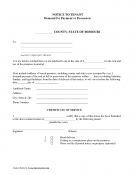 Notice to Pay or Quit – If rent is not paid on the due date, the landlord has the right to post a notice informing the tenant of the possibility of eviction. Although no specific amount of notice is named in state law, best practice is to inform the tenant that he or she has three (3) to five (5) days to pay the amount owed before the landlord begins the eviction process (§ 535.020, §535.060).
Notice to Pay or Quit – If rent is not paid on the due date, the landlord has the right to post a notice informing the tenant of the possibility of eviction. Although no specific amount of notice is named in state law, best practice is to inform the tenant that he or she has three (3) to five (5) days to pay the amount owed before the landlord begins the eviction process (§ 535.020, §535.060).
Download: Adobe PDF
Maximum Fees ($)
Late Rent Penalties
There are no statutes about the fees that residential landlords may impose for providing the rate after the date it is due. Landlords are generally permitted to assess fees for delivering rent after the date on which it is due if the fee is stated in the lease agreement and is reasonable.
NSF Checks
Although Missouri law provides for penalties for providing checks linked to accounts without sufficient funds to carry them in other contexts, such as the criminal law or laws associated with child support, there are no laws specific to the residential rent check situation, and it is unclear whether these laws apply to the landlord-tenant context. Best practice is, if a landlord wants to impose an NSF fee, for the fee to be stated in the lease agreement, and for the fee to be reasonably related to costs borne by the landlord as a result of receiving a check with insufficient funds.
Tenant’s Unclaimed Property
Under Missouri law, personal property found inside a landlord’s dwelling unit is considered abandoned if:
- The landlord reasonably believes that the tenant has abandoned the property
- The tenant is late paying rent by at least thirty (30) days
- The landlord provides the tenant with the following notice, both by mail and in a posting on the dwelling unit
The rent on this property has been due and unpaid for thirty consecutive days and the landlord believes that you have moved out and abandoned the property. The landlord may declare this property abandoned and remove your possessions from this unit and dispose of them unless you write to the landlord stating that you have not abandoned this unit within ten days of the landlord having both posted this notice on your door and mailing this notice to you. You should mail your statement by regular first class mail and, if you so choose, by certified mail, return receipt requested, to this address ______ (here insert landlord’s name and street address)
- The tenant fails to either pay rent or respond in writing within ten (10) days of the latter of mailing the above notice or posting it on the property
If these conditions are met, the landlord may dispose of the property, including selling it, without liability to the tenant (§441.065).
